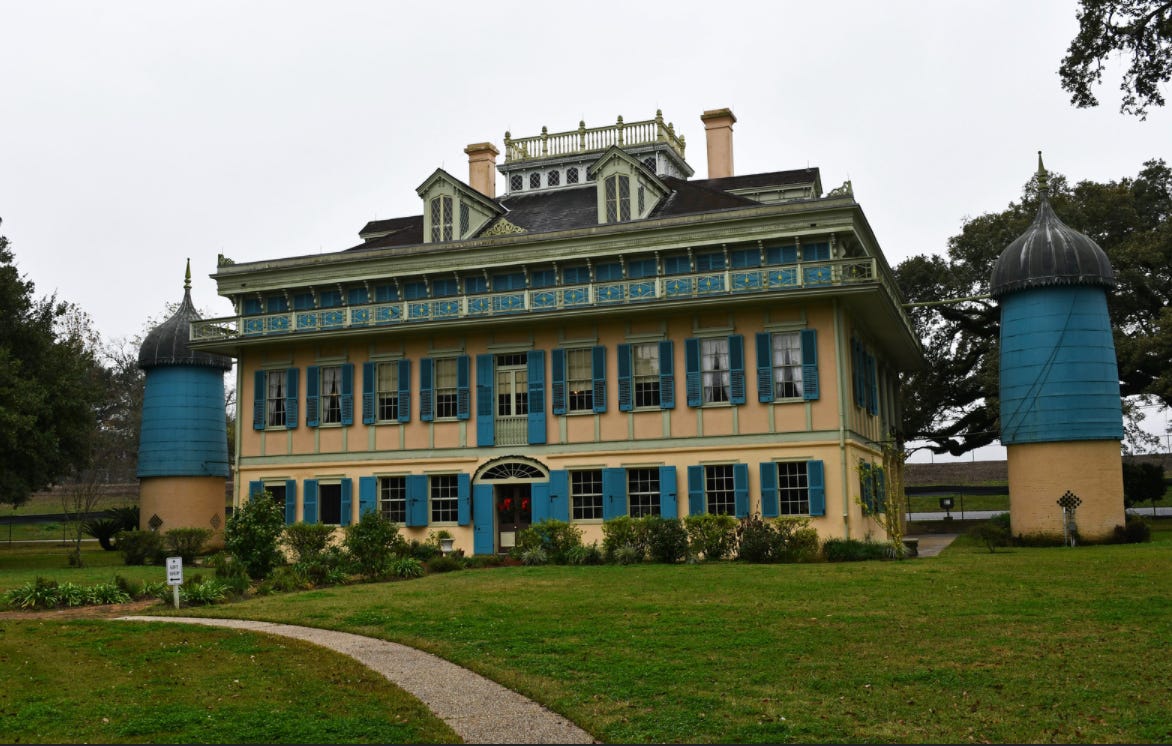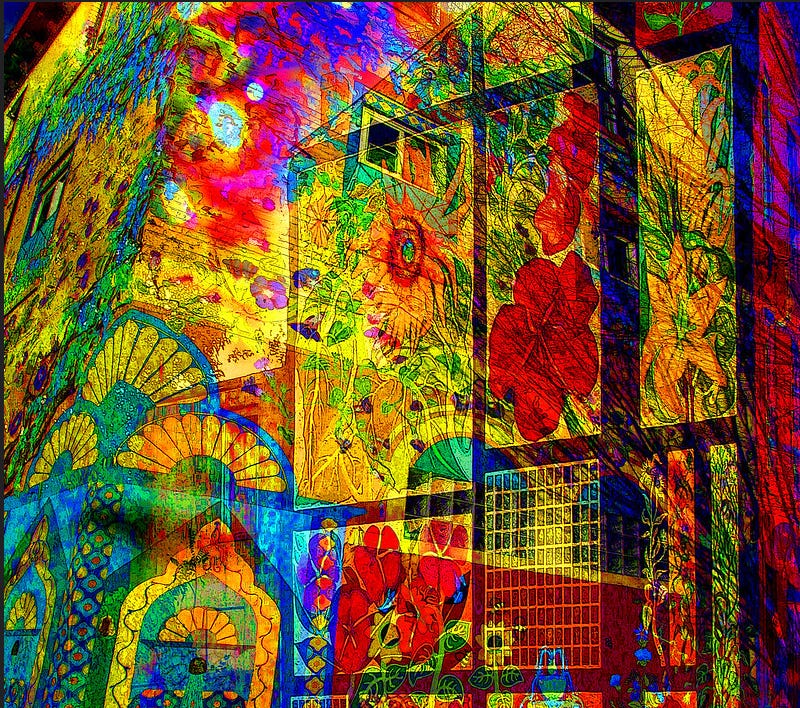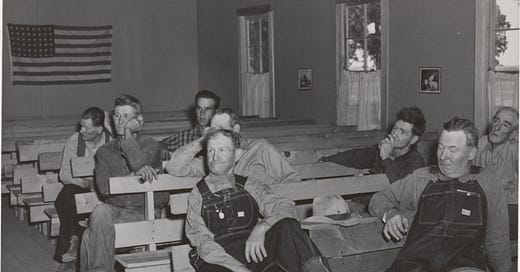
Farm Bureau meeting, Pie Town, NM (NYPL, public domain)
This isn’t an essay about Kamala Harris, though I need to start the story there.
Kamala Harris’ potential new job has been the biggest news story of this past week (if you don’t count the fact that we might not have a Post Office any more? And maybe not an electoral system? Hmm… I should probably look into that). She’s a major party Vice Presidential nominee now, the first Black woman and first South Asian woman to hold that distinction. That’s exciting! And there are a lot of opinions about that (well, not about whether that is factually true, but about her identity, her politics, how you weigh the historic nature of this moment with your affinity for or dis-affinity for those politics, about the very nature of electoralism, etc. etc. etc.).
This isn’t an essay about those debates and it’s especially not an essay about my opinions specifically. It’s about an experience I’ll never understand but that implicates me deeply. It is about a conversation that is alive and active in every community in our country, save for one glaring exception.
It is about how white people are land mines.
More precisely it’s about how living in a nation of white people is, for Black, Indigenous, Asian, Latinx and Arab people, often like having to run across a long, heavily mined battlefield. It’s about how the thing about us white people is that we’re always there, you just don’t know when we’re going to go off.

Oakland mural (William Newton/Flickr)
Kamala Harris is the daughter of Black and Brown academics and activists— a Jamaican father and a Tamil mother. The former is a Marxist Economist, the latter a breast cancer researcher. She grew up in the multicultural, politically vibrant post-1960s East Bay and speaks proudly of being a child of Oakland and of receiving a “stroller’s eye” view of the Civil Rights movement. Her undergraduate years were spent in the Mecca of American Blackness, Howard University, and in the sisterhood of Alpha Kappa Alpha.
I don’t know the source of Kamala Harris’ deep professional ambitions, nor, as a member of the only racial/gender group that is allowed to be unambiguously ambitious, do I have any criticisms of them. What I do know, though, is that if the early portions of her biography points towards our country’s grand history of Black, Indigenous, Asian, Arab and Latinx people building spaces beyond whiteness, those ambitions have often required her to cultivate skills in being the kind of Black and South Asian woman who white people would accept and praise.
Kamala Harris may be a daughter of a pre-gentrified Oakland but she was a political victor across the Bay in San Francisco. Her rise to larger and larger platforms was enabled by her ability to cultivate deep friendship with that city’s great white Brahmin families— the Gettys and Bowes and Fishers and their ilk. It was those families that provided both intense amounts of capital as well as the political cover for Harris to overcome volleys of public misogynoir (initially focused on a previous relationship with former Mayor Willie Brown).
I have no idea as to the extent to which Harris’ comfort and skill with rich white people is strategic or organic. We are all allowed to like who we like. Nor do I know if the aspect of her public record that give me the most pause (a prosecutorial career in which, one could argue, she was significantly tougher- in both rhetoric and action- on low-income Black and Brown families than big corporations) was more a product of core beliefs or strategic triangulation. All I know is that, in 2020 America, it IS possible for a Black and South Asian woman to become a major party Vice Presidential nominee. However, it also seems notable that the particular path that nominee had to walk to get there involved a tough on crime public reputation and many years of keep-the-white-people-happy retail politics.
So too do I know that the moment in Harris’ primary campaign that struck the deepest personal chord with so many, which seemed to exemplify the candidate at her bravest and most inspiring (her deeply personal taking to task of Biden’s coziness with segregationists) was quickly backtracked. Again, I have no idea if Harris’ belief in government-supported school desegregation earnestly only applies to the past, if her honest stance is that particular tactic’s time has come and gone. What I do know is that, in that debate and its aftermath, she navigated a path that perfectly lit up progressive white people’s righteousness about long-dead racists while absolving that same group of any contemporary discomfort.

An extremely fancy house in San Francisco (pontla/flickr)
I really meant it when I said this essay wasn’t about Kamala Harris. Because while I see the navigation through white-people-land-mines throughout her personal story, that’s not unique. Let us remember that the number one reason why Joe Biden is the Democratic Presidential nominee is that both Rep. Jim Clyburn and a state full of Black Democrats made the calculus that he would be the most palatable choice to a nation of reactionary white voters. Let us also remember that Donald Trump owes his entire career not simply to white people’s propensity to blow up but our absolute zeal in doing so in the most destructive and painful ways possible.
Actually, I’ll take this one step further. I can’t get all this land-mine business out of my mind for a set of reasons that have nothing to do with electoral politics. Like many white people reading this right now, I’m lucky to have many Black, Indigenous, Latinx, Arab and Asian people in my life who’ve made me feel comfortable, happy and safe. I consider many of them to be real friends (and some of them may very well think the same of me). What I’ve learned over time, though, is that many of those friends and acquaintances have had to put in an immense amount of strategic work into upholding zones of safety and comfort for me in our shared spaces. They’ve learned how to walk the line with me lest my personal land mine blows up.
Likewise, I’ve been lucky to work in professional spaces with successful, ambitious Black and Indigenous and Latinx and Arab and Asian people. I know intimately the feeling of pride that comes when a white person looks at their workplace and feels that it matches whatever arbitrary personal bar for diversity and inclusion they’ve developed. And then, I’ve heard the other side of that story— the exhaustion and pain and burnout that comes from having to survive and succeed in white spaces, from the code switching, from the stereotype threat, from all the smiling through the racism.
And as much as we now know that it’s the “correct answer” to deny this feeling, I remember the pride and self-satisfaction that came from voting for the first Black President. I remember feeling that I was part of something deeply righteous and historic and brave and not seeing, in the Obamas’ biography, the same strategic navigation of how to keep white people safe that can be found in Harris’.

Mural, Philadelphia (brillianthues/flickr)
If we white people are, in fact, a field full of landmines, how do we stop merely applauding or decrying those who are able to weave their way through us and instead start helping each other in the grand defusing?
I don’t think it’s merely to read White Fragility and to try to guilt ourselves into transcending this particular story of whiteness by ourselves, in order to be the exception to other white people’s rule.
Instead, I’d argue, the project in front of us is about aligning on a different collective vision of what we dream for, both out of our local institutions and the country as a whole. If you want to defuse the white landmines in your workplace, what would it look like for you and your co-workers, led disproportionally by your Black, Indigenous, Latinx, Asian and Arab colleagues, to imagine dramatically different ways of working together that don’t start from the conceit of white-centeredness? If you want a country whose political imagination isn’t just limited by what won’t offend white people, how are you helping support and give energy to young Black, Brown and Indigenous activists (the Sunrise Movement and Dream Defenders of the world) who are dreaming of and asking for a very different model of what our country’s systems could look like?
The first step towards walking those roads, though, is to admit that we white people are, in fact, landmines. And though we should never deny the agency of Black, Indigenous, Latinx, Asian and Arab people (painting them as mere victims of the terrain we create), nor should we pretend that so many stories in our country aren’t already pre-strategized to survive the unwelcome terrain we’ve created. This is true both in the stories of Black, Latinx, Asian, Arab and Indigenous people who make us feel comfortable and inspired as well as those whom we criticize and with whom we have valid disagreements.
It is not our praise or critique that will make us more useful partners in building a better world. It is not merely our ability to judge other people’s performance in walking through our mine field. It will instead be our ability to take collective responsibility for making that walk less dangerous and exhausting while aiding in the planting of something new on top of now-barren terrain.




"If you want a country whose political imagination isn’t just limited by what won’t offend white people" - I haven't heard our national reality described like this. It is the truest thing. And it's not just the white Trump supporters. It's you and me.
Thank you Garrett - your post provides an incredibly helpful analogy. The study of Kamala's balancing act is instructive too. The long-form piece on Kamala in May's Atlantic article talks a bit more about that tightrope and Kamala's intent, stating Kamala "comes across as a woman who is cashing in her chips, taking all the political and social capital she was safeguarding for all those years and putting it on the table, declaring that her moment is now."